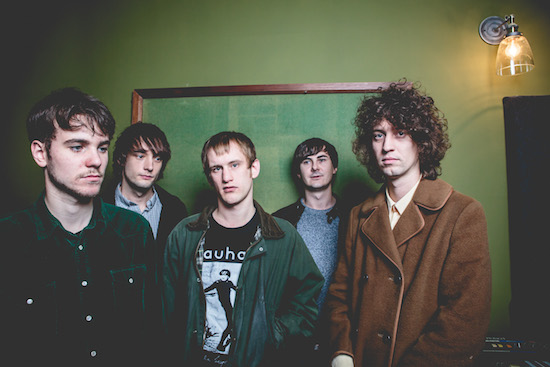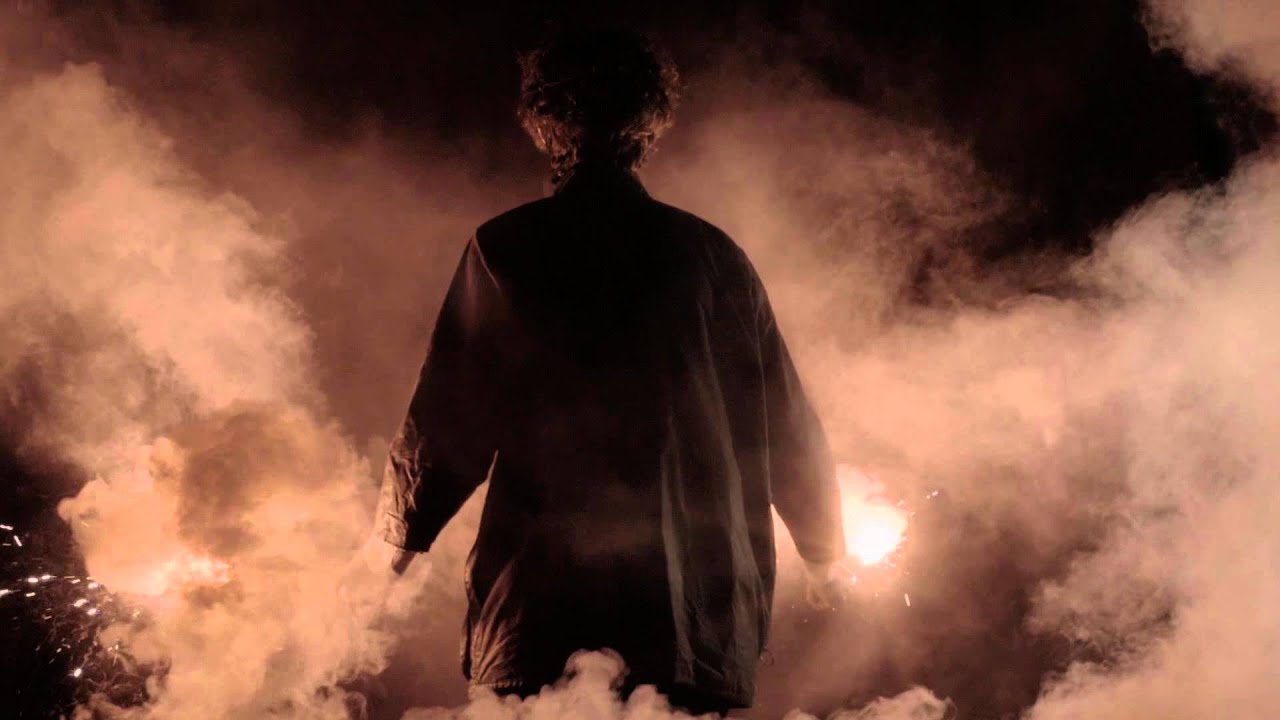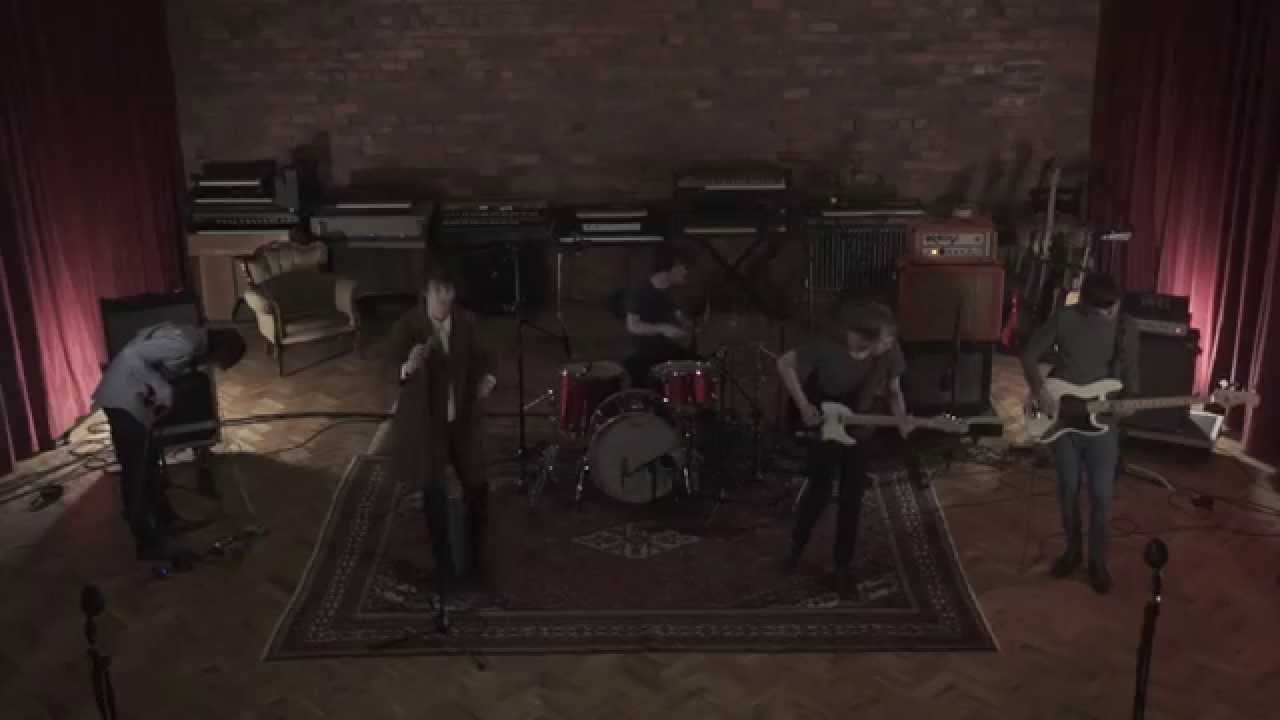There is just the correct amount of swagger about Craig Johnson. Sat in a back room of a Northern Quarter bar-cum-gig venue in Manchester, the frontman of Leeds-based Autobahn is quietly explaining why the Leeds band’s debut album is a "dense and powerful listen".
And Johnson is right to be bullishly confident. After a couple of thrashier EPs, Dissemble cranks up a fug of doom-loaded post punk that evokes the faded memory of post-industrial landscapes and the oppressive loneliness of youth, thus placing Autobahn on a similar plane to fellow Leeds-based contemporaries, Eagulls and Hookworms.
However, Johnson is steadfast in his belief that Dissemble is an "optimistic" album, bathed in dark Northern humour, even if titles such as ‘A Beautiful Place To Die’ suggest otherwise. To his point, a recent billboard campaign in Leeds advertising Dissemble and featuring smiling children holding balloons stood in front of a funeral hearse replete with ‘Autobahn’ spelled in flowers does suggest a mischievous sense of fun.
Later that evening, the five-piece (guitarists Gavin Cobb and Michael Pedel, bassist Daniel Sleight and drummer Liam Hilton complete the line-up) play a headline set to a decent-sized and inquisitive crowd. As walls of guitar noise pour into the smallish room, it’s immediately apparent that Johnson conveys a cocksure presence – artfully flitting between insouciant death stares and some classic goth-rock posturing.
The band are impressively tight (a reward reaped from the incessant practice Johnson had early alluded to) and wholly believable. Watching the show is the mighty John Robb. I stand with him towards the back. Three songs in Robb nudges me, nods towards the stage and shouts "they’ve got it" into my ear. It would seem that "it" is, indeed, a dense and powerful listen.
What was your initial vision for Autobahn? Was there a particular void in the world of music that you wanted to fill?
Craig Johnson: In the beginning I had a clear direction of the sound I wanted. I was listening to punk music and enjoying seeing what Eagulls were doing. They were friends. I saw Iceage when they came to the UK and I enjoyed what they were doing. Therefore, at the time we wanted to make some noisy punk. We weren’t trying to fill a void; we were trying to be as good as our peers.
The album sounds quite different from your first two EPs. Was that very deliberate on your part?
CJ: It was just a progression. The first EP was done quickly and we were very much an angry punk band – with a bit extra – and the second EP continued with that. It was then time to sit back and write an album. We wanted it to be memorable and I knew what I wanted it to sound like. I wanted it to feel bleak, but – and I am not sure many people are feeling this – I wanted it to also feel optimistic. To me, the album is really optimistic. You read some of the titles and you may not think so. It is a dense and powerful listen, but it is optimistic. I didn’t want to shy away from anything. I wanted it to be like our live show – a full-blown force in your ears.
You say the album is optimistic, but contains songs entitled ‘A Beautiful Place To Die’, ‘Suicide Saturday’ and ‘Deprivation’. So, talk me through that conundrum.
CJ: It’s how you want to look at it. It’s a romanticised view of those topics. With ‘A Beautiful Place To Die’, I was driving in the countryside outside Leeds and it had been snowing. It was a sunny day and I remember thinking that if I died now in a terrible crash, then at least it would be a beautiful place to die and that it would be nice to know where you would die – and to know that place would be a nice place. I know it may sound stupid, but the song is a romanticised take on that idea.
I can see how that idea came together, but is there a danger that people might not easily get that sense of optimism?
CJ: Autobahn are all pretty optimistic people, believe it or not. We all have a dark sense of humour, and many of the songs are trying to take that darkness and make light of it. ‘Suicide Saturday’ is really about the drudgery of every Saturday being the same, while ‘Deprivation’ is about being trapped in a situation that you are trying to escape. People may not hear that when they listen to the lyrics – and I understand that – but they are optimistic lyrics from my perspective. This album couldn’t have been written anywhere other than the North. Dark humour is a Northern trait, isn’t it?
So I suppose the infamous funeral hearse billboard was a good example of dark Northern humour? How did that come about?
CJ: We knew we were going to get a billboard and we were excited about it. We knew we needed to do something good. Gav, our guitarist, and I wanted something ridiculous so we thought of getting a coffin with some flowers that spelled ‘Autobahn’ and then we’d find some kids, get some balloons, and have the kids laughing in front of the coffin. It was kind of a celebration of dark humour. We did it really cheaply, but it is probably best thing we’ve done. It was up at Hyde Park corner in Leeds for two weeks around the release of the album. It was replaced by Alt-J’s bloody arena tour. I told Eagulls about the billboard and they threatened to paint my phone number on it, but it was three metres up so they couldn’t really reach.

Photograph via Autobahn’s Instagram
Talking of Leeds, I saw a quote from you that said you could tell when a band is from Leeds just from listening to their sound. What is the Leeds sound?
CJ: I think it’s that Sisters Of Mercy thing. Whenever I hear a Leeds band I can tell they are from Leeds – it’s something to do with having a ‘goth twang’ about the music. I can almost feel the dry ice.
Does dry ice permeate Dissemble and make it a Leeds-sounding record?
CJ: It’s weird, because this album is in no way directly influenced by The Sisters Of Mercy. The only thing I can think of was when I read David Byrne’s book [How Music Works], and in the first chapter he talks about how the surroundings can mould what your music sounds like. I believe that’s why some of the Leeds bands do sound similar. Eagulls practice next door to us in an old industrial factory with terrible sound in the practice room – absolutely horrendous – so you can barely hear the vocals on the PA, and I think that has something to do with creating a certain, similar sound. We are all friends as well, and that probably partly rubs off on each band – we listen to the same sort of music. However, it is weird how it happens over generations. I cannot explain that.
Dissemble was recorded over a six-week period. I assume that was longer than you had for the EPs. How was the recording experience?
CJ: The EPs were recorded over a weekend. For the album, the period of writing beforehand was fucking intense. It was every single day of the week, after work and at the weekends, and losing your mind in it. The recording was that again – for me, I really did lose myself in it. Six weeks may seem like a lot of time but it allowed us to do things we’ve never been able to do before and that has made it a more complete album. It was an intense process, but production-wise we have everything we want on this album. Apart from the kids choir.
That’s a missed opportunity.
CJ: We wanted one, but we couldn’t get one. There was a school opposite where we recorded and we kept saying "someone go and ask them". There is a line at the end of the last song [‘Deprivation’] that goes, "Take the knife/ Break me apart" that might have been quite cool to get a bunch of kids to sing.
How do you approach your live shows?
CJ: We will always be a well-practised band. The studio sound is only adding an extra layer, which we can get away with losing when we play live. The Dissemble stuff has been going really well at shows. I do enjoy playing live and it’s nice to get the songs across, but I do really enjoy the creative side. This last year of torture in writing this album has been the most rewarding thing ever.
Dissemble is out now on Tough Love Records and the band play the Sebright Arms in London on December 1; for full details and tickets, head to their website




